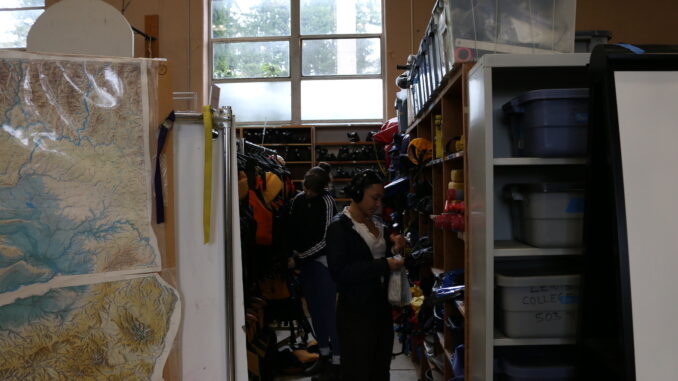
Students gain leadership experience, find opportunities to grow in nature trips around PNW, NorCal
College Outdoors (CO) is a Lewis & Clark organization that takes students on peer-led trips into the wilderness of the Pacific Northwest and Northern California for adventures in hiking, backpacking, rafting, kayaking and more. Experience and equipment are unnecessary, as CO trip leaders are trained to help participants with any potential hurdles and the organization can loan out gear.
CO Program Director Joe Yuska is committed to spreading knowledge to students about the logistics of outdoor trips and the ecology of the areas they visit.
“Our mission is basically to offer the LC community and mostly undergrads the opportunities to get off campus,” Yuska said. “To learn different outdoor skills, to learn emergency medicine skills, to go backpacking in rafting and kayaking and learn about ancient forest ecology and basically get a great introduction to all the wonder(s) of the Pacific Northwest.”
In addition to the education and opportunity trips provide, they also keep the community active and allow students to build connections.
“It’s non-competitive, personal exercise, but also there’s quite a bit of group bonding that goes on like a sports team when people are all camping out together or backpacking together or going out (on a) rafting trip together,” Yuska said. “There’s just a lot more chances to meet new friends and make new connections when you’re sitting around the campfire looking at the stars at night, or making your camp. It’s just a great way for people who otherwise would have maybe not met each other on the Lewis & Clark campus to make friendships.”
One trip subset that is responsible for a lot of CO’s renown is the New Student Trips (NST), which are offered to incoming first years and transfer students. Both Katie McColgin ’25 and Bryn Romig ’25, who now work as trip leaders, first got involved with CO through NSTs.
Romig had NSTs recommended to her on a prospective students tour. On that trip, she was told she would make a good trip leader and happily obliged. This past year she had the opportunity to lead the same NST she went on, a backpacking trip around Mt. St. Helens.
“It was really interesting to do that same sort of schedule, but go from this participant position to a leader position,” Romig said. “I understood how different the positions really are and the responsibility and the role that a leader plays in connecting these very scared freshmen strangers.”
Aside from the NST, Romig has assistant-lead several trips and is leading a trip to the redwoods over spring break. Coincidentally, McColgin’s favorite CO trip she has ever been on was last year’s iteration of the redwoods trip.
“I remember kayaking in the ocean and seeing seals swim around me and seeing all kinds of animals, all kinds of sea anemones,” McColgin said. “There was this cave that we crawled through on the beach and it was just caked in sea anemones and all sorts of stuff. Also, just hiking is beautiful in the redwoods.”
However, McColgin’s specialty is rafting trips. She spent last summer working as a raft guide on the Arkansas River in Colorado and has only led CO trips that involve rafting.
McColgin’s preferred role in trip leading is the planning and logistics, which are important for the success of the trip and the safety of its participants, but she likes having an entertainer, someone good with riddles and starting conversation, as her partner. She has grown in the role of entertainer throughout her time leading rafting trips, though, and believes it is an essential part of the experience.
“You can take people down the river and make sure that they’re safe,” McColgin said. “But, if you’re not talking to them, if you’re not telling stories or telling jokes — That’s just a really big part of rafting in general.
In regards to safety, both McColgin and Romig have their Wilderness First Responder (WFR) certification as is required of trip leaders. Romig took the course in Florida over winter break of last year.
“It was pretty rigorous, it was pretty exhausting, especially having (my) first semester of finals ever and then having a two week break and suddenly finding myself another academic type setting,” Romig said. “But, it made me a lot more confident about being prepared for risk.”
CO takes many precautions to ensure the safety of its participants. McColgin took rafters on more difficult runs at her summer job, even though LC rafters being “a lot more competent at paddling.”
For nature enthusiasts who want to go on trips not offered by CO or plan their own itinerary, the organization also rents its gear out to students. If interested, students should email CO with equipment requests by the Wednesday before they need it.
Subscribe to the Mossy Log Newsletter
Stay up to date with the goings-on at Lewis & Clark! Get the top stories or your favorite section delivered to your inbox whenever we release a new issue.

Leave a Reply